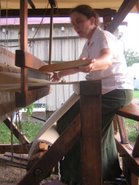All of my slide lectures are now available for zoom meetings. These were all designed to enhance my hands-on weaving, spinning and knitting classes but they also work very well as stand alone programs for guild meetings and other settings. My fee is $200 for a 90 minute program followed by live Q&A. Email program inquiries to melissaweaverdunning@gmail.com.
UPDATED - Lecture fees are now $250.
Available programs include:
Available programs include:
L’Amour de Maman - Acadian Weaving The earliest
European settlers arrived in Maritime Canada beginning in 1632 and were
known as Acadians. Caught in the political conflict between France
and England, the Acadians were forcibly removed from their homeland in 1755 and
many spent ten long years imprisoned or homeless before eventually settling in
Louisiana where they became known as Cajuns. 250 years later, Cajun
weavers were following the same weaving traditions as their Acadian
foremothers. Come and hear about this remarkable story and see the
beautiful fabrics they created on their two harness looms!
Donegal Tweed - The history of this unique
Irish tweed from northwest Ireland dates back to the earliest textile factories
in Ireland that gathered hand spinners and hand loom weavers together to
provide income in an area of poor soils and subsistence farming. Donegal tweed is still a thriving industry
today
Norman Kennedy's Ethnic Spinning Scrapbook - Master Weaver and Spinner Norman Kennedy was born in 1933
and he kept an old-fashioned scrapbook from the time he was a teenager,
collecting images of spinners and weavers from around the world. Melissa Weaver Dunning began her study of
weaving and spinning in 1980 at The Marshfield School of Weaving in Vermont
with Norman as her teacher. This slide
show presents a fascinating selection of spinners from around the world with
enlightening commentary.
The Colorful History of Tartan, being a portrait of People, Places and Practices - Once a colorful pattern woven
and worn by Scottish Highlanders, tartan was outlawed by the British government
after the Jacobite Rebellion in 1745. The
history of how tartan came to be both a fashion icon and a national symbol of
Scotland is full of fascinating characters and stories.
Tweeds and District Checks, Weaving from the Scottish Lowlands - Many modern suits and sport
coats are made from this iconic twill cloth, using patterns that were developed
from the age old Shepherd’s Check and from the colors of the surrounding
landscape. These color & weave
designs and heathered dyed in the wool yarns have their own stories to tell,
starting with a quick look back at tartans and moving on to the period after
the Jacobite uprising and the Scottish Clearances.
18th c. Household Textiles - Domestic
hand weavers produced a wide variety of fabric from their rustic looms for
clothing, bed coverings, toweling and table linens. Modern weavers will be
inspired as we explore two private antique textile collections to see samples
of garments, cotton toweling, linen napery, linsey-woolsey, overshot, Venetian
carpeting and wool blanketing.
Shaker Weaving and Textiles - Many are familiar with Shaker chairs or buildings,
but the Shakers also applied their fundamental principles of utility,
simplicity and proportion to textiles.
They are known for weaving poplar strips into cloth for baskets, bonnets
and fans, utilitarian cloth for their own use, heavy fulled wool fabric for the
Dorothy cloaks they wore and sold, and simple but unique rag rugs that still
delight hand weavers today. We will examine hand woven textiles from the archives of three Shaker museums: Pleasant Hill in Kentucky, Hancock in Massachusetts and Canterbury in New Hampshire.
Shaker Weaving with an emphasis on
Shaker Rugs - As above, but with a special focus on the unique
aspects of Shaker rugs.
Traditional Knitting from England, Ireland and Scotland - Many of the foundations of
traditional knitting come to us from England, Ireland, and Scotland: Fisherman’s
ganseys, Aran cable knitting, Fair Isle multi-colored patterned knitting and
delicate Shetland lace. We will explore
each of these traditions through images of garments and knitters, old and new.




















4 comments:
Hi Melissa
I am with the Western Reserve Spinners and Weavers Guild (North East Ohio). We are using Zoom for our monthly meeting so hearing that your lectures are available online sounds very interesting.
We usually meet in the evening on the fourth Tuesday of the month and we are looking for a speaker for August and September.
Can you provide your speaking fee schedule?
Bob Breitzmann
robert.breitzmann@gmail.com
WRSW-VP
Hi Melissa,
How do I find out more about your online classes?
Lisa
Hi Lisa - You can contact me at weaverdun@aol.com
Hi Melissa,
I'm a program chair for the Desert Weavers and Spinners in the Coachella Valley of California.
We are looking for Zoom presentations for our members, for February, March or April.
Do you have a program on Shaker and/or Tartan weaving? What is your fee schedule?
thanks,
Kat Macdonald
kathleen.macdonald@threadandwater.net
Post a Comment